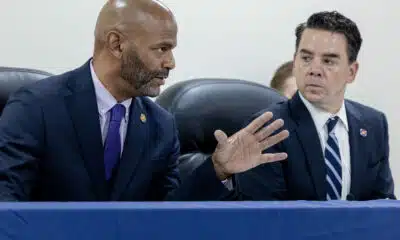Mississippi News
Welfare: Mississippi, other states turn away most applicants
Data Dive: Mississippi not the only state turning away most welfare applicants
Years before Mississippi’s welfare scandal broke, one statistic provided a foreshadowing: The state had approved just 1.5% of applications for cash welfare in 2016.
In the month of April of 2017, when the figure hit the local news, the Mississippi Department of Human Services approved just five out of 824 applications, or 0.06%, for assistance under the federal Temporary Assistance for Needy Families Program.
Inexplicably, the department’s TANF application approval rate immediately increased to around 25% after that. But the caseload of people on the program continued to decline. In 2018, at the height of the scandal, Mississippi spent $113 million in federal TANF funds – its annual allotment of $86.5 million plus unspent funds from past years – and just 5% went to cash assistance for needy families. That left over $100 million in virtually free money for officials to spend.
But Mississippi isn’t the only state that turns away most applicants for TANF. Texas, for example, is approving less than 5% of people applying for the aid, according to federal data analyzed by Mississippi Today.
Nationally, only about 21% of families living in poverty received cash welfare in 2020. In Mississippi, Texas, Arkansas and Louisiana, that figure is 4%.
The current assistance program, born out of welfare reform in the 1990s, replaced the former Aid to Families with Dependent Children entitlement program with a block grant that allows states broad flexibility to spend the money as they wish. The assistance program became a work program. The main metric states would be required to track within the program was the percentage of recipients meeting work requirements.
Since then, the number of poor families that receive what is commonly referred to as the “welfare check” has fallen nationally from a monthly average of about 4.5 million families in 1996 to less than 800,000 in 2022. In Mississippi, the number fell from nearly 48,000 families to about 1,600.
Instead, states spend the bulk of the federal money, about 80% of the $16.6 billion nationally in 2020, on other services such as workforce training activities ($2.6 billion), child care ($1.4 billion), child welfare ($1.2 billion), out-of-wedlock pregnancy prevention ($129 million), and fatherhood programs ($114 million).
But there is no federal repository of data showing which organizations actually receive the money to perform these functions, what specific programs they offer, how they spend the money, who they help and what outcomes they achieve. In the case of Mississippi, the state didn’t compile this information either.
The open-ended program resulted in one of the biggest public fraud scandals in Mississippi history under the administration of former Gov. Phil Bryant, whose office oversaw the welfare department’s strategy and goals. State and nonprofit officials used tens of millions in federal funds that were supposed to assist very poor families — or at least offer opportunities to families to help them avoid falling into poverty — to purchase property, lavish their friends and family, or to prop up programs that had little to do with alleviating poverty. Meanwhile, the state divested from the legacy public assistance programs, which were serving fewer and fewer people.
Welfare expenditures inspired by NFL legend Brett Favre — including a $1.1 million advertising contract, $5 million in payments towards the construction of a volleyball stadium and $2 million for a pharmaceutical venture he was investing in — have made national headlines.
Millions in total also went to other purposes, including pro football players and wrestlers, lobbyists, a virtual reality academy, expensive PR campaigns and a conservative talk radio station.
Mississippi characterized most of these purchases to the U.S. Department of Health and Human Services as "Work Supports" or "Fatherhood and Two Parent Family Formation," but the federal government did not require the state to report virtually anything more than that.
The state auditor, who is responsible for annually auditing state agencies that spend federal funds, uncovered the purchases, but only after a Mississippi Department of Human Services employee took a small tip of suspected fraud related to the former welfare director and the wrestlers to Bryant, who turned that over to the auditor.
Today, Mississippi’s use of TANF funds is not totally clear. Of the $86.5 million it receives from the federal government each year, just $3.7 million went to direct cash assistance in 2020, the latest federal financial data available. In the two years since the scandal broke, TANF caseloads continued to decline to a low of 166 adults and 2,067 children in January of 2022. They’ve grown slightly since then, but nowhere near the roughly 6,700 adults and 17,500 children on the program 10 years ago in 2012, and even further from the roughly 33,000 adults and 96,000 children on the program in 1996.
The Mississippi Department of Human Services still pushes out a large portion of TANF funds to nonprofits and organizations to provide various services.
After the auditor's investigation began, the department began requiring organizations applying for TANF subgrants to submit formal requests for proposals — a standard accountability procedure that hadn’t been in place since 2012, according to records Mississippi Today requested. It also now pays subgrantees on a reimbursement basis, instead of making upfront payments. In the 2021 grant year, the department awarded grants to 25 organizations for a total of around $36 million in awards.
The grants cover parenting initiatives ($8.1 million), after school programs ($13.7 million), and workforce development ($14.9 million).
"In its continuing training cycles, MDHS is also striving to define more clearly what a model subgrantee looks like," the agency said in a statement Monday. "That model subgrantee is a partner who delivers genuine value to the TANF population by focusing on key activities such as, but not limited to, workforce training and parenthood initiatives."
The department has not yet issued awards for the 2022 grant year, which ended this month.
The state also uses around $30 million in TANF funds each year to supplement the budget of the Mississippi Department of Child Protection Services, the state agency tasked with investigating child abuse and overseeing the state’s foster care system, which is typically shortchanged by the state Legislature.
It’s unclear how Mississippi Department of Human Services may be using the rest of the grant funds. In the state’s public accounting system, not all TANF expenses are labeled “TANF,” making it impossible to conduct a full accounting with the publicly facing data.
Asked for an accounting, MDHS only provided the figures for subgrants ($34.5 million) cash assistance ($4.1 million) and child welfare ($30 million), which leaves out nearly $20 million in funds available to the state annually.
"MDHS can draw down the remaining funds in the future for purposes allowed under the four tenets of TANF. MDHS is looking to create long-term solutions that address the past TANF block grant problems in Mississippi," the statement reads.
Historically, the department has offered transportation vouchers of $250 to people in the work program. Mississippi Today has retrieved records in the past reflecting these payments, but the department did not provide a current figure reflecting this service.
The agency says it is working to revise its annual report — which has historically provided meager information — to include a fuller accounting of the program by the end of this year.
In 2020, following the scandal, the state racked up $47 million in unspent federal TANF funds. The current balance is not reflected in public records.
With the corruption reportedly quelled, Mississippi Department of Human Services is now approving about 8% of people applying for cash welfare.
The following graphs, compiled using federally available data, paint a picture of the history of the TANF program in Mississippi.
MDHS explained the fluctuation in TANF application approval in a statement Monday, saying: "Given abnormalities in the TANF Block Grant from 2017-2020, MDHS cannot speak to the validity of the data referenced. Decreasing TANF participation rates are not isolated to Mississippi. Data that tracks TANF approval rates since 1996 shows that TANF participation rates continue to decline nationwide. This is likely a result from PRWORA (Personal Responsibility and Work Opportunity Act, the federal law enacting TANF) amending welfare (AFDC) to workfare (TANF). As the state continues to emerge from the pandemic, MDHS is experiencing increased approval for TANF cash assistance, while also working to recruit new workforce partners to open additional opportunities for families to participate in the program."
MDHS addressed the state's TANF caseload, saying, "MDHS experiences the same issues with eligibility today, as when PRWORA was created in 1996. MDHS is committed to reaching as many Mississippians as possible. In the past year, MDHS has taken steps to connect Mississippians to funds that provide tangible help In 2021, MDHS instituted the first TANF cash assistance increase since 1999. In November 2021, MDHS instituted the Child Support pass through. From July 2021-June 2022, MDHS saw an increase in number of qualified participants."
"MDHS continues to make efforts to promote the TANF program to clients and address any barriers to participation," the statement continued. "We believe that over time more families will choose to participate in the program. To some extent, the current emphasis on abuses of the past may likewise be having a chilling effect on current applications.
"As the agency moves forward, MDHS is committed to creating a viable TANF plan that will work for generations, not just 'good enough for now,'" the agency statement reads. "This requires long-term strategic planning, in which the agency is presently engaged MDHS is currently developing a new strategic plan and data definitions to track TANF utilization accurately and closely going forward."
This article first appeared on Mississippi Today and is republished here under a Creative Commons license.
Mississippi News
Suspect in Charlie Kirk killing is charged with murder as prosecutor says DNA found on rifle trigger
SUMMARY: Tyler Robinson, 22, was charged with the murder of conservative figure Charlie Kirk, shot Sept. 10 at Utah Valley University. Robinson confessed via text to his partner and left a note expressing intent to kill Kirk, citing hatred. DNA linked Robinson to the rifle used. Prosecutors revealed Robinson planned the attack for over a week and targeted Kirk, a key conservative youth leader. Robinson’s political views shifted after dating a transgender man, causing family tensions. After the shooting, Robinson discarded evidence and urged his partner to delete texts. FBI investigates possible wider connections. Charges include murder with potential death penalty enhancements.
Read the full article
The post Suspect in Charlie Kirk killing is charged with murder as prosecutor says DNA found on rifle trigger appeared first on www.wjtv.com
Mississippi News
Suspect in Charlie Kirk assassination believed to have acted alone, says Utah governor
SUMMARY: Tyler Robinson, 22, was arrested for the targeted assassination of conservative activist Charlie Kirk in Orem, Utah. Authorities said Robinson had expressed opposition to Kirk’s views and indicated responsibility after the shooting. The attack occurred during a Turning Point USA event at Utah Valley University, where Kirk was shot once from a rooftop and later died in hospital. Engravings on bullets and chat messages helped link Robinson to the crime, which was captured on grim video. The killing sparked bipartisan condemnation amid rising political violence. President Trump announced Robinson’s arrest and plans to award Kirk the Presidential Medal of Freedom.
The post Suspect in Charlie Kirk assassination believed to have acted alone, says Utah governor appeared first on www.wjtv.com
Mississippi News
Americans mark the 24th anniversary of the 9/11 attacks with emotional ceremonies
SUMMARY: On the 24th anniversary of the 9/11 attacks, solemn ceremonies were held in New York, at the Pentagon, and in Shanksville to honor nearly 3,000 victims. Families shared personal remembrances, emphasizing ongoing grief and the importance of remembrance. Vice President JD Vance postponed his attendance to visit a recently assassinated activist’s family, adding tension to the day. President Trump spoke at the Pentagon, pledging never to forget and awarding the Presidential Medal of Freedom posthumously. The attacks’ global impact reshaped U.S. policy, leading to wars and extensive health care costs for victims. Efforts continue to finalize legal proceedings against the alleged plot mastermind.
The post Americans mark the 24th anniversary of the 9/11 attacks with emotional ceremonies appeared first on www.wcbi.com
-
News from the South - Kentucky News Feed7 days ago
Lexington man accused of carjacking, firing gun during police chase faces federal firearm charge
-
News from the South - Alabama News Feed7 days ago
Zaxby's Player of the Week: Dylan Jackson, Vigor WR
-
News from the South - Arkansas News Feed7 days ago
Arkansas medical marijuana sales on pace for record year
-
News from the South - North Carolina News Feed5 days ago
What we know about Charlie Kirk shooting suspect, how he was caught
-
News from the South - Missouri News Feed7 days ago
Local, statewide officials react to Charlie Kirk death after shooting in Utah
-
Local News7 days ago
US stocks inch to more records as inflation slows and Oracle soars
-
Local News6 days ago
Russian drone incursion in Poland prompts NATO leaders to take stock of bigger threats
-
Local News Video6 days ago
Introducing our WXXV Student Athlete of the Week, St. Patrick’s Parker Talley!


















































